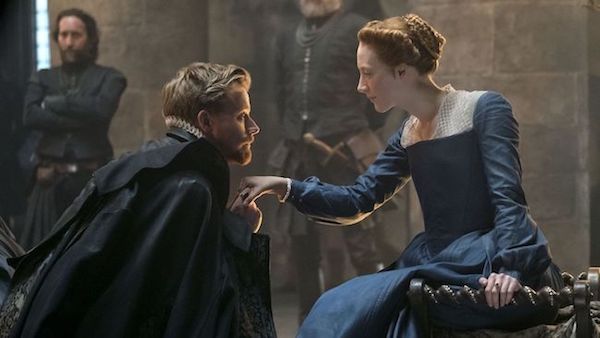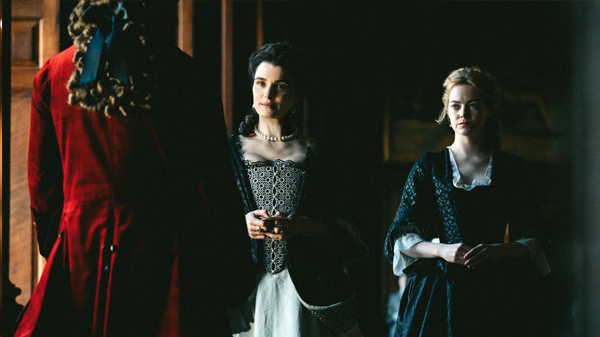READ ME is a platform for female-led writing on film hosted by Girls on Tops. Louisa Maycock (@louisamaycock) is Commissioning Editor and Ella Kemp (@efekemp) is Contributing Editor.
From Mary Stuart to Anne of Great Britain, the queens on the big screen are revealing how sexuality can define a kingdom. Iana Murray unravels the politics of passion in two subversive period dramas.
In Josie Rourke’s Mary Queen of Scots, a late-night rendezvous between Mary and her suitor Lord Darnley invites the viewer behind the curtains that surround her bed. Lord Darnley kisses his way down Mary’s body, as the camera stays on her face — Saoirse Ronan writhes in ecstasy as the young queen grips the bedsheets. At this point, the camera would usually to pan to the window, leaving the rest to our imagination. But Rourke subverts the norm and switches the gaze, letting the audience watch as Mary revels in pleasure.
What makes Mary Queen of Scots uniquely potent is the way in which it confronts the biological reality of womanhood. Period blood is noticeable while Mary is washing, giving menstruation a rare moment of exposure. When modern tampon adverts are still hesitant to show blood, there is power in the splash of crimson in Mary’s bathwater. Beyond normalising, the scene is also indicative of the pressure that is put on Mary’s body, where blood is as shattering as a battle. In a kingdom obsessed with producing heirs, pregnancy becomes a strategic move. It’s a laborious task, rather than one born of a genuine desire to have children. The fact that Mary can find sexual pleasure is even more noteworthy, as by seeking it, she is able to reclaim the gratification of sex for herself — not the country.
Mary Queen of Scots challenges gender norms beyond the women who lead it, as the men are equally evident of the film’s interrogation of gender dynamics. There’s a recognisable role reversal, in which male characters are given the one-dimensional functions that are typically assigned to women. Joe Alwyn’s Robert Dudley exists only as Elizabeth’s love interest. He becomes a victim of the strategic battle between the duelling monarchs, tossed over to Mary for marriage and back again in a failed attempt to secure Elizabeth’s throne. Likewise, Mary’s husband Lord Darnley does little to dampen her ambition. As soon as she gets swept away by his charm, she is met with the reality of his sexuality. His adultery doesn’t transform her into the embittered wife, but makes her more determined to take the British throne. The men are always under the mercy of their partners, enabling the women to be in constant control of themselves and their sexuality.
Set in a warped vision of Queen Anne’s court, sex becomes a much more devious act in Yorgos Lanthimos’ The Favourite, one that is simultaneously blissful and calamitous. The three women at the film’s centre form the axis from which every other character orbits. Olivia Colman is the reigning Queen Anne, while her lover Lady Sarah (Rachel Weisz) runs the country in her place. Their comfortable dynamic is shaken by the arrival of Sarah’s cousin Abigail, played by Emma Stone, who instigates a love triangle as she climbs her way up the ranks. As a queer film, The Favourite does away with men almost entirely, and the ones who do exist are merely pawns in an intimate battle for power. Joe Alwyn’s Masham is soft and handsome, nothing but a pretty face, while Harley, played by Nicholas Hoult, is a sparring partner for Sarah and Abigail who, as much as he tries to fight back, succumbs to their control. The archaic narrative afforded to a political landscape usually dominated by men is discarded, in favour of the intimate female relationships within the palace walls. Sex is just one weapon in the arsenal that Sarah and Abigail wield, but it’s the one that causes the most damage. Love and sexuality are repurposed as a significant power that shapes not only their own fate, but the future of the country.
Anne wears the crown, but her vulnerability is always within reach, indicative of the shifting dynamics between the three leads. Her weakness manifests physically in the gout that almost paralyses her, the heavy makeup that veils her blemishes, and her 17 pet rabbits – one for each child she has lost. Sarah’s brutal honesty makes her aware of her imperfections, but it’s also Sarah who provides loving affection when the pain becomes too much to bear. Anne is trapped within an ouroboros of self-loathing. Sarah and Abigail feed off these vulnerabilities, manipulating the field until the risks become too great. Sarah threatens to out Anne, but it’s a hasty move born out of desperation – that results in her banishment. No one is punished for being gay, rather their individual downfall is brought on by betrayal and mistrust. It would be easy to point to a larger allegory about homophobia, but the focus always remains on the women. It’s the fracturing of these relationships that makes The Favourite all the more tragic.
In spite of the illness that is taking over her body, Anne is also able to reclaim her sexuality. She revels in being fought over and desired. The devious screenplay from Deborah Davis and Tony McNamara sharpens the characters’ tongues to sting like blades. “I like it when she puts her tongue inside me”, Anne says to Sarah, before leaving her to nurse the devastating blow. When Sarah confronts Anne about her relationship with Abigail, the queen takes pleasure in the jealousy she is causing. Anne kisses Sarah out of Abigail’s sight, like teenagers making out in a secluded corner. These passionate and giddy affairs allow Anne to escape from the pain of her self-hatred – even though this happiness is always short-lived. The camera contends with the ways in which the three women gain or lose power, right to the very end as it frames Anne in a low-angle shot. She remains in power, but her actions result in entrapment, present in her scowl which dominates the frame. Desire becomes a coveted prize that can be manipulated and taken advantage of, and The Favourite considers the cost of such a prize.
Mary Queen of Scots and The Favourite depict the ways in which women can reclaim control over their sexuality, and to a larger extent, what has been taken from them. Sexuality is integral to this reclamation of power – no longer repressed, women use desire and pleasure to their advantage. Mary Queen of Scots is forthcoming about female bodies and sexual pleasure, and these priorities are embedded within Mary and Elizabeth’s battle for the crown. In The Favourite, sex is a tool to manipulate and shift the delicate dynamics of Queen Anne’s court. Sex becomes a subversive power, capable of liberating women from standards as stifling as their corsets.
Iana Murray (@suspiriana) is a film critic based in Scotland. She is studying for a joint bachelor’s degree in film & media and journalism studies. Her favourite movies are ones about love that make her cry and she writes about them for The Skinny and Much Ado About Cinema.



